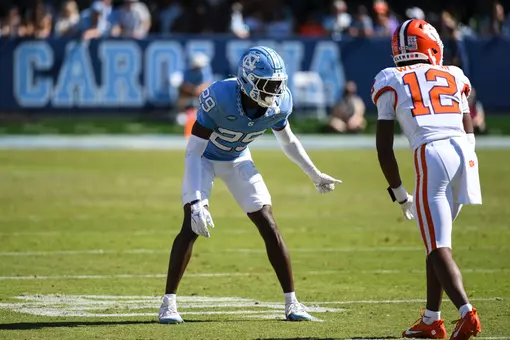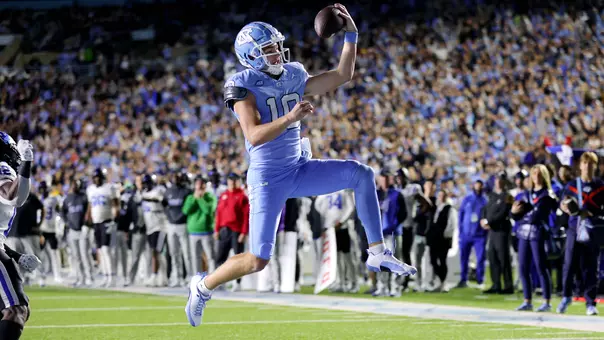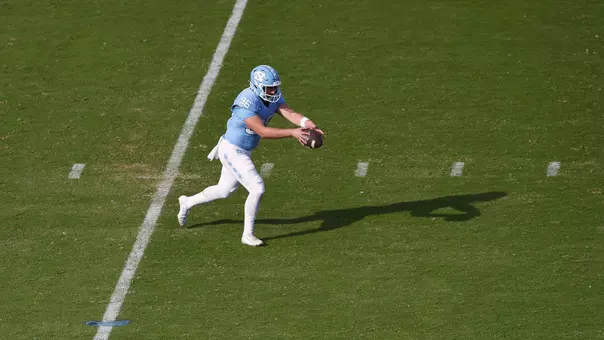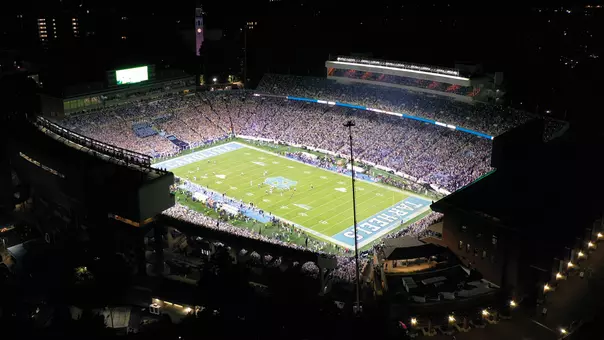University of North Carolina Athletics
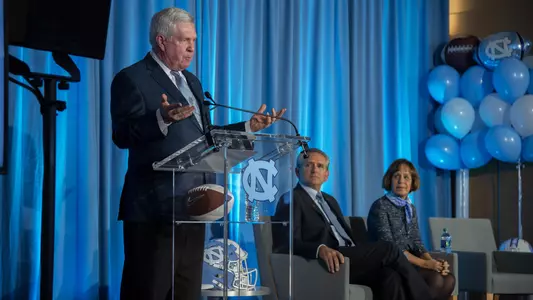
Extra Points Signing Day Live Blog
December 19, 2018 | Football
3:50 p.m.
Brown ends a wide-ranging, informally presented press conference. He eschews the use of a lectern and stands in front of the media, providing tidbits of information on each player as he shows highlight tapes on a large screen behind him.
He talks of the hectic nature of the last three weeks: Evaluating existing commitments, finding and luring new recruits, hiring staff and monitoring the existing roster to the degree he could during exams period.
"I had a long time to rest," Brown says. "I missed coaching and missed recruiting and missed the kids. Things might have gotten to be a grind at my last job, but everything is so much fun right now."
On flipping QB Sam Howell earlier that afternoon:
"It's really important. It sends a message that we are going to go after the best players in the state, and to have maybe the best player choose us says a lot. We will have a full year to recruit next year, so as good as we did in three weeks, I think we'll have a tremendous year next year."
On what he likes about Howell:
"Sam grew up loving University of North Carolina, we got behind on him and worked hard to catch up. He has strong legs, quickness, he can run, he has some Baker Mayfield in him. There's a magnetism about him, he's really a great leader, kids are drawn to him. He's got that x-factor. He knows how to win game games."
On his thought process in hiring Phil Longo as offensive coordinator and Jay Bateman as co-defensive coordinator:
"We'll be similar to Oklahoma on offense—we want to score 50 points a game and have two Heisman Trophy winners. We're going to have a power running game with a wide-open passing attack.
"I'm amazed at what Coach Bateman did at Army West Point. He held Oklahoma to 21 points in the regular season. He gets the most with lesser players than teams he's played. He's spent time in North Carolina like everyone on our staff has so he knows this state. That's so important in recruiting."
Brown noted that two January enrollees were coached by former Tar Heels who played under Brown in the 1990s—linebacker Khadry Jackson of Windermere, Fla., and receiver Emery Simmons of South View High in Parkton. Jackson was coached by Brian Simmons, a linebacker from 1994-97, and Simmons by Marcus Wall, a receiver from 1992-95.
"You walk in and see Brian Simmons and Marcus Wall coaching them, you have a smile on your face," Brown says. "You know you have a chance."
2:45 p.m.
Brown, the offensive coaches and defensive coach Tommy Thigpen are gathered in the offensive staff room to watch QB Sam Howell's announcement from Sun Valley High, Thigpen because he led the Tar Heels' recruiting efforts the last three weeks.
Howell has a Florida State cap and a Tar Heel cap in front of him. Brown and the Tar Heel staff believe Howell is opting for them, but until he pulls the trigger, they can't be sure.
As soon as Howell picked the Carolina blue lid and puts it on, the coaches erupt in high-fives all around.
QB coach Phil Longo recruited Howell while at Ole Miss but says he didn't have a chance because of an NCAA bowl sanction on the Rebels.
"He's durable and he can move well enough to extend the pocket," Longo says. "If you block eight yards, he can still get 15 on the draw. He can pull the ball on inside zone and he can make any throw. The fact he can make any throw and is really accurate is really big for me."
2:20 p.m.
Brown is in the media room on the fifth floor of Kenan Football Center, standing beside a big screen that will be used later in a press conference to show highlights of every signee.
Cornerback Obi Egbuna comes up. Brown says that the cornerback from Charlotte was being pursued by Jay Bateman at Army and had been coached by Bly in a Charlotte 7-on-7 league.
"Both Jay and Dré agreed he was not being recruited nearly has wide or as hard as his talent warrants," Brown says.
On receiver Welton Spotsville from Havelock: "He comes from a great program, has good hands and ball skills, he's used to winning. He can play a lot of places."
On offensive tackle Wyatt Tunall pancaking a defender: "He loves to hit and hunt."
When another O-lineman, Asim Richards, comes up, Brown pronounces his first name much like the word "Awesome."
"What a name," he says. "I'm changing my name to Asim."
On punter Ben Kiernan: "He can change the field."
And of interest with defensive linemen Tomari Fox, Kevin Hester Jr. and Kristian Varner, Brown notes that all of them seem to have good hands—something you wouldn't associate with playing the defensive front.
"With modern offenses using whole field, that changes your makeup," Brown says. "The big heavy D-end does not have a place any more. Today they have to rush the passer, take on the 330-pound offensive lineman, play the draw, play the screen and play the sweep. Everybody has to be able to catch the ball or get a fumble. Turnovers are so key."
1:17 p.m.
Tommy Thigpen was being recruited as a linebacker out of Dumfries, Va., in the fall of 1988 when Mack Brown made a promise to him and his father.
"If you'll take a chance on us right now, I promise you this University will take care of you the rest of your life," Brown said.
The point was not a literal one, of course, but a figurative one—if you'll make the commitment and give four years of your life, you'll emerge with the skills, wherewithal, friendships and network that will serve you forever.
"Coach Brown was exactly right," Thigpen said one year ago, just having returned to Chapel Hill to join Larry Fedora's coaching staff. "Every move I've made as an adult has been governed by someone I met at Carolina or a lesson I learned there. I've been telling that story for 20 years."
Thigpen has pitched that idea often the last year in recruiting circles as he's worked to convince top high school players to cast their lots with the Tar Heels.
Imagine some of those prospects' surprise the last three weeks when Thigpen has circled back around with that very same Mack Brown in the flesh to build on the story and the point it made.
"They look at me like, 'You had to know' Coach Brown was coming back," Thigpen says. "No, I didn't. Yes, you did. No, I honestly had no idea.
"But it's pretty cool to see him now that make the very same promise to a kid and his dad like he did with me and my dad."
12:45 p.m.
While the Tar Heel staff is waiting on an announcement from another prospect later in the afternoon, they gather on the fifth floor for a catered lunch. By coincidence one visitor in Kenan Football Center is Darrell Moody, a scout with San Francisco 49ers who was Brown's first offensive coordinator and quarterbacks coach when Brown was hired at Carolina in 1988.
Moody was an integral part of the recruiting staff that in time took Clemson mostly out of the state of North Carolina recruiting picture and elevated Carolina to being "the cool place" to be among in-state schools, as Brown said at his early December press conference.
"Mack puts a plan together better than anyone I've ever been around," Moody says while taking a break from evaluating film in the Carolina video suite. "He knows what he's look for at every position. One thing I've learned being a scout for 18 years is that when you go into the great programs, all the tight ends look the same, all the linebackers look the same, all the defensive ends look the same.
"They know what they're looking for and they recruit and develop to that plan. We had that here in the 1990s and I'm sure Mack will get it back again."
Moody stayed at Carolina through 1995, later did a stint under Carl Torbush with the Tar Heels and has also coached at LSU, N.C. State and Clemson.
"Mack seems energized being back in the business," says Moody. "He can still relate to kids and the high school coaches. He's the CEO. He hires a good staff and lets them do the work. But he sets the standard.
"I remember when we first got here and were going to the high school coaches' clinic in Greensboro that first summer, what Mack said was, 'We are going to win the clinic.' By that he meant we were going to shake more hands and hang out in the hospitality room longer than anyone.
"That philosophy I'm sure will not change."
11:20 a.m.
Phil Longo is shown a photo from 1991 of a mustachioed coach from Glassboro State being soaked with Gatorade following a big win that lifted the team into the NCAA Division III national playoffs.
"John Bunting," he says with a smile. "What a coach. Players loved to play for that guy."
Longo, Carolina's new offensive coordinator, was quite familiar with Carolina and Chapel Hill long before Mack Brown called three weeks ago to talk about the job. Longo played for Bunting at Glassboro (which later became Rowan University) and early in his coaching career in the 2000s came to Chapel Hill frequently for spring practice and clinics when Bunting was the Carolina coach from 2001-06.
"I have slept in this building," Longo says from in his fourth-floor office in Kenan Football Center. "I slept on the sofa in Coach Bunting's office. I have sat at the meeting table, been in the film room. There was an element of familiarity with what the University of North Carolina was all about when Coach Brown first called me."
Longo was a young coach with big dreams and no money one summer in the late 1990s when he attended a coaching clinic at the University of Kentucky run by head coach Hal Mumme and offensive coordinator Mike Leach.
"I slept in my truck and snuck a shower in the football building when no one was looking," he says. "That's when the light popped on—Mike Leach and the 'Air Raid' offense. Mike was renowned for talking ball late into the night. We had fun and I learned a lot."
Since then, Longo has adapted and evolved Leach's philosophy of using four wide outs, one running back, no huddle and throwing the ball at least two-third of the time.
"We will be wide open, but we will definitely have a downhill running element," he says. "Like Lincoln (Riley, the Oklahoma head coach and an Air Raid disciple) I've branched off to make sure you have a physical run element to the offense. At Sam Houston State in 2014, we ran the ball for 3,800 yards. The next year, 3,700 yards and were still throwing it all over the yard.
"We will have the ability to do both—run downhill when we need to and chasing space in the passing game."
9:50 a.m.
Dre Bly had been trying to get into the coaching business for several years since retiring from the NFL in 2009. He'd been coaching some 7-on-7 teams in Charlotte and even pitched former Tar Heel coach Larry Fedora on the idea of joining his staff. Bly had remained close over two decades with Mack Brown, his coach during the first of two Bly's three seasons from 1996-98 as an All-America cornerback for the Tar Heels.
When Brown was hired three weeks ago, Bly shot him a text of congratulations and was in the background at Brown's introductory press conference in the Blue Zone. The next morning, Bly got a call from Corey Holliday, an associate athletic director in the Carolina football office, asking if he could be in Chapel Hill to meet with Brown at 1 p.m.
"Corey said to plan on a couple of hours," Bly says. "I had my suit on and all my materials for an interview. I walked in to see Coach Brown, we shook hands and talked a few minutes. He said he wanted me to coach his cornerbacks and he'd pay me x-y-z. He said, 'How does that sound?'"
"Coach, I'm all in. He said, 'We're putting the band back together.' It took all of 10 minutes."
Bly smiles thinking of his first recruiting trip with Brown, Brewster and Thigpen when they toured a handful of high schools.
"It was like The Beatles," he says. "You won't believe the energy we generated. We turned some heads walking through high schools. There were a lot of smiles around us wherever we went."
What Bly lacks in coaching experience, he makes up for with passion for Carolina, the game and seeing young players develop.
"Energy—energy with no limits," Thigpen says. "You just have to point him in the right direction."
Brewster says given a little time, Bly will "be a superstar in our profession. Think of this: How many staffs in the country have a Hall of Fame coach and a Hall of Fame cornerbacks coach? Not one."
9:10 a.m.Several Tar Heel assistant coaches are milling about as the last of the morning wave of signings come through. Many are setting up texts and phone calls for later in the day with Brown and 2020 prospects.
Jay Bateman pauses from working his phone to talk about his recent arrival in Chapel Hill as the Tar Heels' new co-defensive coordinator (along with Tommy Thigpen). Bateman spent five years at Army West Point as defensive coordinator, and over that time had several interactions with Brown and knew when Brown called two weeks ago that he'd love to work for him.
One was when Brown came to West Point to talk to the Black Knights during the 2015 season, and the other was when Brown was the color analyst for Army's 2017 game against San Diego State in the Armed Forces Bowl in Fort Worth. Bateman and Brown spent about an hour two days before the game talking football.
"At West Point we have all kind of people come through and talk to our team," Bateman says. "We've had Presidents, CEOs, NFL players and coaches, NBA players. If you ask our kids who were the two or three guys who really stood out, who made an impression, the two would be J.J. Watt and Mack Brown.
"Then we talked at the bowl game last year. At the time, I never thought of him getting back into coaching. Now looking back on it, he was acquiring data. I think he had in the back of his mind he'd like to get back into coaching."
Brewster and Bateman talk about some of the recruiting priorities for the Tar Heels on defense in the short and long term, and Brewster tells Bateman of Carolina's prowess on defense during the final two years of Brown's first tenure at Carolina.
"Thirteen points a game allowed one year, 10 points a game the next," Brewster says. "With the kind of talent we had on that side of the ball, it didn't matter what you called. All you had to do was say, 'Sic 'em.'"
Bateman smiles.
"No pressure, huh?"
8:50 a.m.Carolina has just gotten a text and signed scholarship papers from Triston Miller, an offensive tackle from Charlotte Country Day. Miller had originally been committed to another ACC rival before coaching transitions at that school prompted him to change plans.
"The staff came in here three weeks ago and hit the ground running, and I'm so proud of what they've done in a short period of time," Brown says. "We're fighting the early signing day, because a lot of kids have already signed somewhere else. You've got to evaluate the ones you've already got and find out who's still out there—and all the while you're trying to hire staff and coaches. And you're not in Chapel Hill much of that time."
Once the December signing day is completed, Brown will have the chance to catch his breath with the holidays before hitting the road again in January.
"We'll be looking at adding another half dozen kids in February," Brown says. "There are still some good ones out there. Last year was the first year of the December signing day, and I think a lot of the best players jumped to sign then, thinking they might not still have an offer if they waited. Now they've gotten a better feel for how it works. Not everyone is signing early, and that's good for us."
8:10 a.m.
Brewster was on Brown's staff at Carolina from 1989-97 and then went with him to Texas for five years before moving on to jobs in the NFL at San Diego and Denver, as head coach at the University of Minnesota and then more college jobs at Mississippi State, Florida State and Texas A&M.
Through that time, Brewster never took his eyes off Carolina and wanting to be back in Chapel Hill. In fact, in 2016 he and his wife built a house just south of town eyeing their eventual retirement.
"It is just so comfortable for me being back here," Brewster says. "I love everything about this place. It's been so much fun getting on the road and driving. There are more people in this state than before, I've noticed that. But what's still fun is getting on the roads less traveled. I stay off of I-40. I go the back roads to Charlotte or Wilmington."
Brown and Brewster reminisce about how when the recruiting juggernaut was up and running in the early to mid-1990s, Carolina was getting its pick of the majority of top players in North Carolina.
"Most of ours when we got really good, they were all coming," Brown says. "We weren't missing on many. We didn't have much drama."
"This is the most underrated state in America in terms of high school players," Brewster says. "There are more players in this state … if you just get the best players in North Carolina, you can win all your games. That's what we're going. In a short period of time what we've accomplished nothing short of extraordinary.
"There's a new energy here."
7:45 a.m.
Brown and Tim Brewster, associate head coach and tight ends coach, are sitting in the atrium on the fourth floor of Kenan Football Center as texts and phone calls start to come in from players who have committed to Carolina.
Typical of the exchange as each player officially evolves from prospective Tar Heel to real Tar Heel is this between Brown and the player's mother:
"I am doing great now that you called and your family are all officially Tar Heels," he says. "What a great day. We just became an extension of your family. We love you and appreciate you and the fact you raised such a great young man. It's going to be fun for us to have you part of our lives from now on. This is the next forty years, you're not getting rid of us in four. You've raised such a great son and this is the start of the next chapter of his life. It is a celebration, there is no question. I wish we could be there and hug your neck, but we'll just have to do it long distance."
Then Brown gets the new Tar Heel on the phone.
"Congratulations, you are now officially a Tar Heel," Brown says. "Go have some fun, get stronger and get your grades in order, you'll be in Chapel Hill before you know it. We are all so pumped. We will have a press conference at 3 o'clock and I can brag on you. We're going to have a great class, we've made up a bunch of ground in three weeks."
6:55 a.m.Excitement. That hasn't changed in the four decades Mack Brown has been a football coach and National Signing Day dawns.
"We're off to a good start," Carolina's new head football coach said early Wednesday morning as he and his staff gathered in Kenan Football Center to begin processing commitments from their first signing class.
"Carolina has always been a special place and we've done a good job finding guys who want to be here. The guys who play well are the ones who want to be here. So if they back out on you today, we're better off in the long run. I tell the coaches, do your best to get them here. If they don't want to come, let them go."
And speed matters as much in 2018 as it did three decades ago. Brown in his first tenure at Carolina from 1988-97 built a program around players who could run. When the Tar Heels got really good at the end and landed in the top 10 in 1996-97, Brown had recruited well enough that he moved cornerbacks to safety, safeties to linebackers, linebackers to defensive end and moved ends into tackles.
"That's not changed," he says. "The three things, they have to be athletic, have to have character and have to be competitive. Speed at every position is key. And even if it's not great running speed, it's quickness, quickness off the ball. 'Explosive power' we called it. That hasn't changed in 30 years."
"What you want is not just the guy you're getting today but the guy who'll get better. We want them to be a much better player in three to four to five years.
"That's where competitive spirit matters and desire to be really good. Who you sign today is not going to be ready to step in play. You have to develop them and they have to want to be developed."
Brown was waiting on the first text expected to arrive at 7 a.m. Follow along here throughout the day as we chronicle Brown's first National Signing Day in his second iteration as the Tar Heels' head coach.











